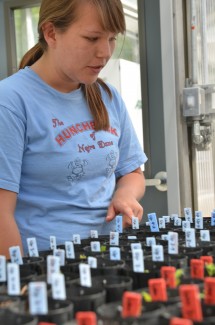The University of Idaho’s new EPSCoR program will begin this fall, and hopefully continue to grow in the next five years, said Rick Schumaker, assistant director of the project.

Kaitlin Moroney | Argonaut
University of Idaho Junior Vanessa Santos checks plants in a greenhouse at the the USDA Forest Service Rocky Mountain Research Station UI’s campus. Santos is majoring in Sustainable Crops and Land Resources and is involved with the EPSCoR research program which provides research practice opportunities for undergraduates.
EPSCoR– Experimental Program to Stimulate Competitive Research — is a platform that widens the research practice opportunities for undergraduates and gets them involved early in the research process. This is a hugely important part of the college experience, said Schumaker.
In its first year, the statewide project will provide research opportunities for more than 50 students throughout Idaho and at least a dozen from UI, Schumaker said.
“It’s not hundreds,” Schumaker said. “But it’s quality not quantity. We’re focused on trying to provide good experiences.”
Schumaker said they have tried to promote the program and inform students about what is available on campus, and EPSCoR hopes to broaden the research opportunities to social and soft sciences as well.
Chemistry, physics and engineering will no longer be the only possible research areas available with EPSCoR in place, Schumaker said, and because the positions are limited, the application process will be competitive.
Sarah Penney, project manager and head of Outreach, Education and Diversity in the EPSCoR program, said they hope to involve students from a variety of backgrounds as well.
“We hope to have at least half of our students be from underrepresented groups,” Penney said. “We’re still in the planning stages as far as how exactly we are going to implement this, which is exciting and fun.”
EPSCoR will match underclassmen with research teams that are not only relevant to their field, but also include a personal local significance as well. The EPSCoR program emphasizes ongoing, expansive research, Schumaker said.
The project scope is larger than just work experience, Schumaker said. It offers networking opportunities, and many of the research projects are paid as opposed to voluntary internships.
“There’s a connection to the place that you are studying,” Schumaker said. “It provides interest and relevance.”
Penney said it gives students a chance to be connected and team up with faculty, or as she calls them, “ambassadors” that will be located at several colleges across the state of Idaho, including Lewis Clark State College and North Idaho College.
“They will be responsible for recruiting students for this program,” Penney said. “We try to build on existing programs that have been doing this all along.”
There is a distinct difference between an undergraduate and a master’s student working on a research project, Schumaker said.
“We see this as a path in the step to someday owning master’s degrees or doctorates,” Schumaker said. “It’s something a lot of students aren’t aware is an option.”
A student’s education trajectory is an idea Penney referred to as a “pipeline.” EPSCoR hopes to bridge the learning communities between high school, college and graduate school, Penney said.
“I was a first generation college student and I was a sophomore before I became aware of a research opportunity,” Schumaker said. “I had never even really considered getting a master’s degree.”
According to Don’t Fail Idaho, a public awareness campaign on Idaho’s education system, only one out of every ten high school freshmen will continue on to graduate college with a bachelor’s degree, Schumaker said.
“What we’re doing is really targeting a bigger picture need to get students motivated and encouraged to pursue higher education,” Schumaker said.
EPSCoR is a research capacity building program, Schumaker said, and they are hoping the impact goes far beyond just students who are directly involved in the projects.
Alycia Rock can be reached at [email protected]

